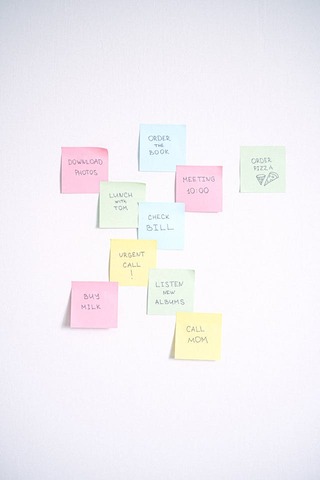Picture this, you are super inspired by all the self care routines and rituals shared by your favorite wellness influencers. Waking up at the crack of dawn to the incessant ringing of your alarm, dragging yourself out of bed with the remnants of sleep still clinging to your eyes.
Jump to 4 Tips: Avoiding Chaos, Restoring Calm

You’ve got your healthy green juice in one hand, your phone buzzing with notifications in the other. Emails, texts, reminders—they all clamor for attention, forming a relentless chorus of demands before you’ve even had a chance to properly wake up. You throw your phone under the duvet and do some morning stretches.

Your eye catches your desk and the cluster of sticky notes laid out remind you of that ever-growing to-do list, looming over you like a perpetual storm cloud. Work deadlines, errands to run, that gym session you promised yourself you’d squeeze in. You reassure yourself in your head ’it will be fine, it’s great, I am getting so much done! I have enough time’.

As you attempt to ‘do it all’, it feels like you’re constantly playing catch-up, forever chasing that elusive sense of balance. Each day becomes a dance of juggling responsibilities, all while trying to carve out a sliver of ‘me time’ between activities.

Climbing into bed at the end of another day, you begin to reflect: no matter how meticulous you are with time management, that to-do list seems to multiply 3 fold, for every one thing completed. It’s a never-ending saga of tasks waiting for their time to shine. Like a little hamster in a wheel, you’re left wondering if you’ll ever catch a break.

One day it hits you, you’re striving to be the best version of you, trying to do all the important things and enjoy quality time, but you’re TIRED. The fun activities have started to feel like a chore. You realize every minute of every day, you are doing something. And even when you do sit down, it is spent planning the next calendar week, meal prep, workout splits and self care schedule. Not to mention time to see friends and loved ones and the ongoing search for even more life hacks and ways to be productive and healthy.
The Illusion Of Doing It All

Society often heaps upon us the expectation of managing multiple responsibilities. From excelling in our careers to maintaining peak physical fitness, practicing mindfulness, and maximizing productivity, we’re bombarded with ideals of what it means to “have it all.”
The Weight Of Expectations

This relentless pursuit of perfection can take a toll on our mental and emotional well-being. We have a limited capacity and the pressure to meet these expectations can leave us feeling overwhelmed and unmotivated, trapped in a never ending cycle of DOING.
Embracing Imperfection

Sometimes it’s okay to leave it until tomorrow
In what can sometimes feel chaotic, it’s important to give ourselves some grace. Embracing imperfection means acknowledging our limitations and accepting that it’s okay not to have it all figured out. Instead of striving for an unattainable standard of perfection, we can find fulfillment in making peace with our flaws and learning to prioritize our well-being over external expectations.
Finding Peace In The Chaos

Ultimately, true peace lies not in the unrealistic pursuit of perfection, but in learning to navigate the chaos with a sense of inner calm. By redefining success on our own terms and prioritizing what truly matters to us, we can cultivate a sense of peace amidst life’s daily demands.
4 Tips: Avoiding Chaos, Restoring Calm
1. Prioritize Tasks: The Eisenhower Matrix
The Eisenhower Matrix1 is a great tool to use as a framework for prioritizing tasks, and simple enough to put in your phone notes.

Designed for management, people have adapted it to their daily lives to reduce feeling overwhelmed with tasks. Open to interpretation, what is urgent for one may be non urgent for another.
It Consists Of 4 Categories:
Urgent and Important: Tasks that require immediate attention and have significant consequences if not completed. For example, a looming work deadline or a medical emergency.
Important but Not Urgent: Tasks that are important for your long-term goals but do not need to be done immediately. Examples include planning for future projects, investing in personal development, or scheduling regular exercise.
Urgent but Not Important: Tasks that demand immediate attention but are not crucial to your long-term success. These often include interruptions like phone calls or emails that can be delegated or postponed.
Not Important, Not Urgent: Activities that neither contribute significantly to your goals nor require immediate action. These might include mindless scrolling through social media or other distractions.
Understanding what fits into each category can vary based on your individual lifestyle and needs. For instance, a hair appointment might not be urgent or important generally, but if you have a significant event coming up, it becomes a priority. The key is to base your decisions on what aligns with your personal values and current circumstances.

2. Set The Date: 📅

While to-do lists are helpful, they can sometimes feel never-ending. To avoid this trap, set specific dates and times in your calendar for when you will tackle each task. This practice not only provides structure but also brings a sense of accomplishment as you see tasks being completed. Now and again, some tasks might need to be carried over, but scheduling them helps ensure that your daily lists are more manageable and satisfying to complete.
3. Be Okay With Things Not Being Okay

Inevitably, there will be times when you can’t ‘keep all the plates spinning’. When this happens, rather than rushing to fix everything immediately, take a moment to breathe and reassess. Accepting that it’s okay to not be 100% all the time is crucial for your mental health, and avoid burnout.
What’s the worst that could happen if you let a few things slide? Often, the consequences are not as dire as we imagine. Allow yourself the grace to pause, regroup, and recharge. This mindset shift not only helps reduce stress but also helps you maintain a steady, more sustainable pace in the long run.
4. Prioritize Your Personal Foundation

Your personal foundation includes the core elements that keep you grounded and functioning at your best. For many, this includes prioritizing sleep, home-cooked meals, and regular exercise. Or perhaps it’s your coffee and reading time, gardening or knitting. Without these foundational elements, it all falls apart. Your basics are non-negotiable for maintaining your overall well-being and should be prioritized accordingly.
By focusing on what truly matters, setting realistic priorities, and accepting imperfections, we can create a more balanced and fulfilling life. The myth of doing it all is just that—a myth. True success and peace come from understanding our limits and making mindful choices that reflect our values.

As you balance life’s many demands, remember that you’re not alone in the journey. I’d love to hear your thoughts and experiences. How do you cope with the pressure to do it all? Share your insights, tips, or even just your story in the comments below and where we can encourage support each other.



